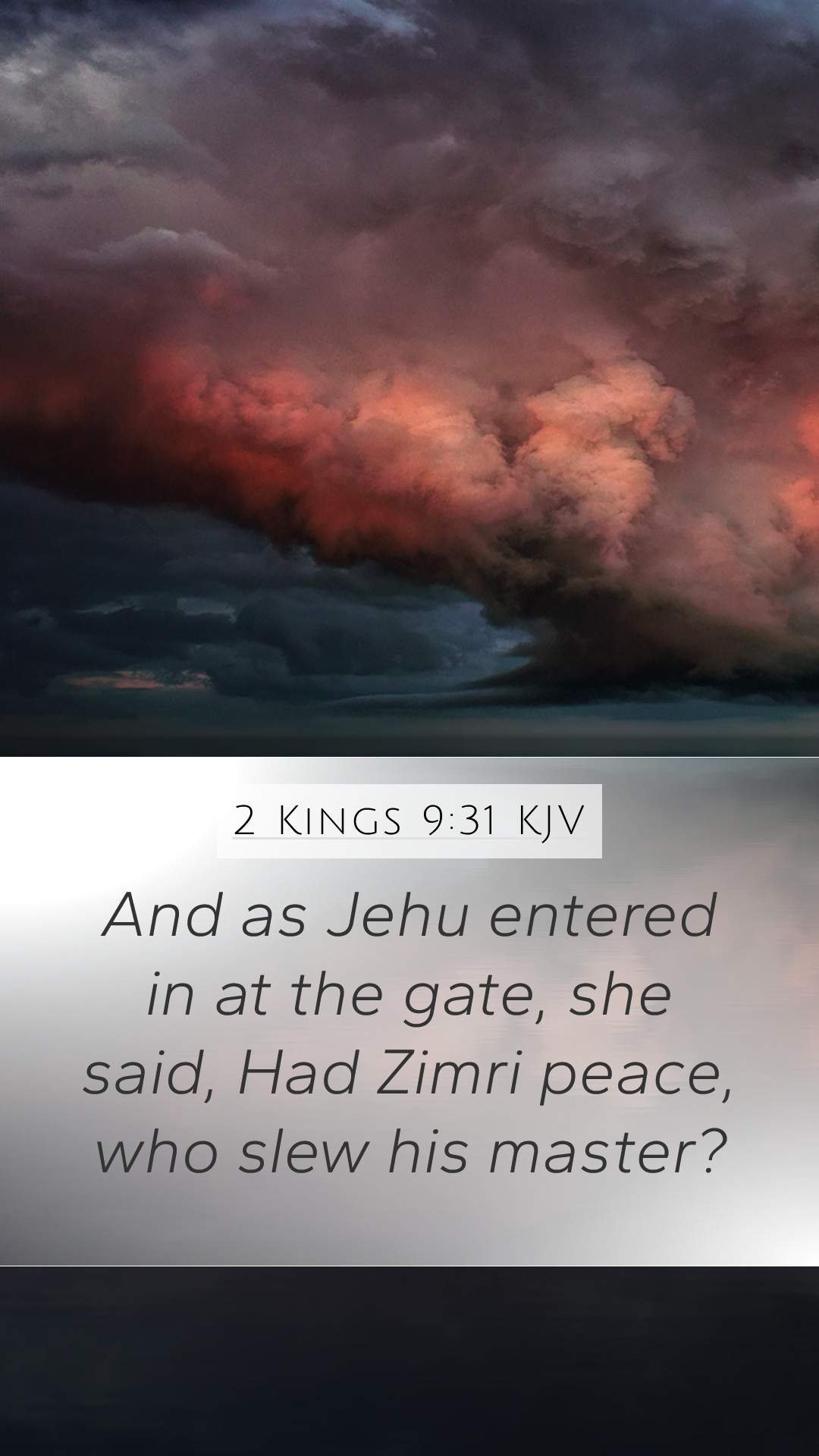Understanding 2 Kings 9:31
“And as Jehu entered at the gate, she said, Had Zimri peace, who slew his master?” This powerful verse from the Old Testament is pivotal to understanding the drama of leadership, divinely ordained purpose, and the stark realities of judgment in Israel's history.
Bible verse meanings
This verse captures the moment when Jehu, anointed to become king of Israel, confronts Jezebel, the notorious queen. Jezebel's questioning of Jehu draws a parallel to Zimri, a historical figure who assassinated his king. She rhetorically asks if Jehu will succeed like Zimri or face similar demise. This question speaks volumes about her awareness of treachery and the potential fate of those who rise to power through betrayal.
Bible verse interpretations
- Jehu's entry signifies action propelled by divine empowerment, as he is on a mission to purge the house of Ahab and destroy idol worship in Israel.
- Jezebel, knowing the violent history of her predecessors, uses Zimri's notorious act as a chilling comparison, implying that Jehu may not be secure in his actions.
- This rhetorical question hints at Jezebel's desperation, reflecting the final moments of her reign which reeked of arrogance and wickedness.
Bible verse understanding
This verse is essential for understanding the tension between Jehu and Jezebel as well as the broader implications of their actions on Israel's spiritual state. Jehu represents a line of godly leadership ordained to overthrow evil, whereas Jezebel embodies the pinnacle of idolatry and manipulation.
Bible verse explanations
The significance of Jezebel’s reference to Zimri underscores the precariousness of power in Israel during this tumultuous period. Her question implies that treachery begets treachery, suggesting that despite Jehu's anointing, he could possibly fall victim to the very violence he implements.
Bible verse commentary
According to Matthew Henry, this moment marks Jezebel’s misguided confidence in her stability in power, even as her downfall looms. Albert Barnes points out that her reference to Zimri serves to instill doubt within Jehu, while Adam Clarke emphasizes her dismissal of Jehu's potential as king, revealing her entrenchment in idolatrous arrogance.
Scripture Analysis
For readers engaging in bible study insights, this passage amplifies numerous themes such as:
- The ultimate fate of evil rulers and the call for justice.
- God's sovereignty in elevating leaders.
- The nature of wickedness and its opposition to divine purpose.
Cross References
This verse correlates closely with:
- 1 Kings 16:8-20: The account of Zimri’s rise and fall.
- 2 Kings 9:6-10: The anointing of Jehu and his divine commission.
- Revelation 2:20-23: The New Testament's warning against the spirit of Jezebel.
Application of the Verse
Those exploring the application of Bible verses to daily life can glean practical insights regarding leadership, the significance of accountability, and the divine judgment against corruption:
- Recognizing that claims to power come with responsibilities and moral implications.
- Understanding that just as Jezebel strived to manipulate her situation, modern leaders must beware of the pitfalls of pride and deception.
- Realizing that God’s purposes will ultimately triumph, even amid corruption and treachery.
Conclusion
In-depth Bible verse analysis of 2 Kings 9:31 reveals much about human nature, power dynamics, and divine judgment. This verse serves as a poignant reminder of the fragility of human authority in light of God's sovereign plan.


